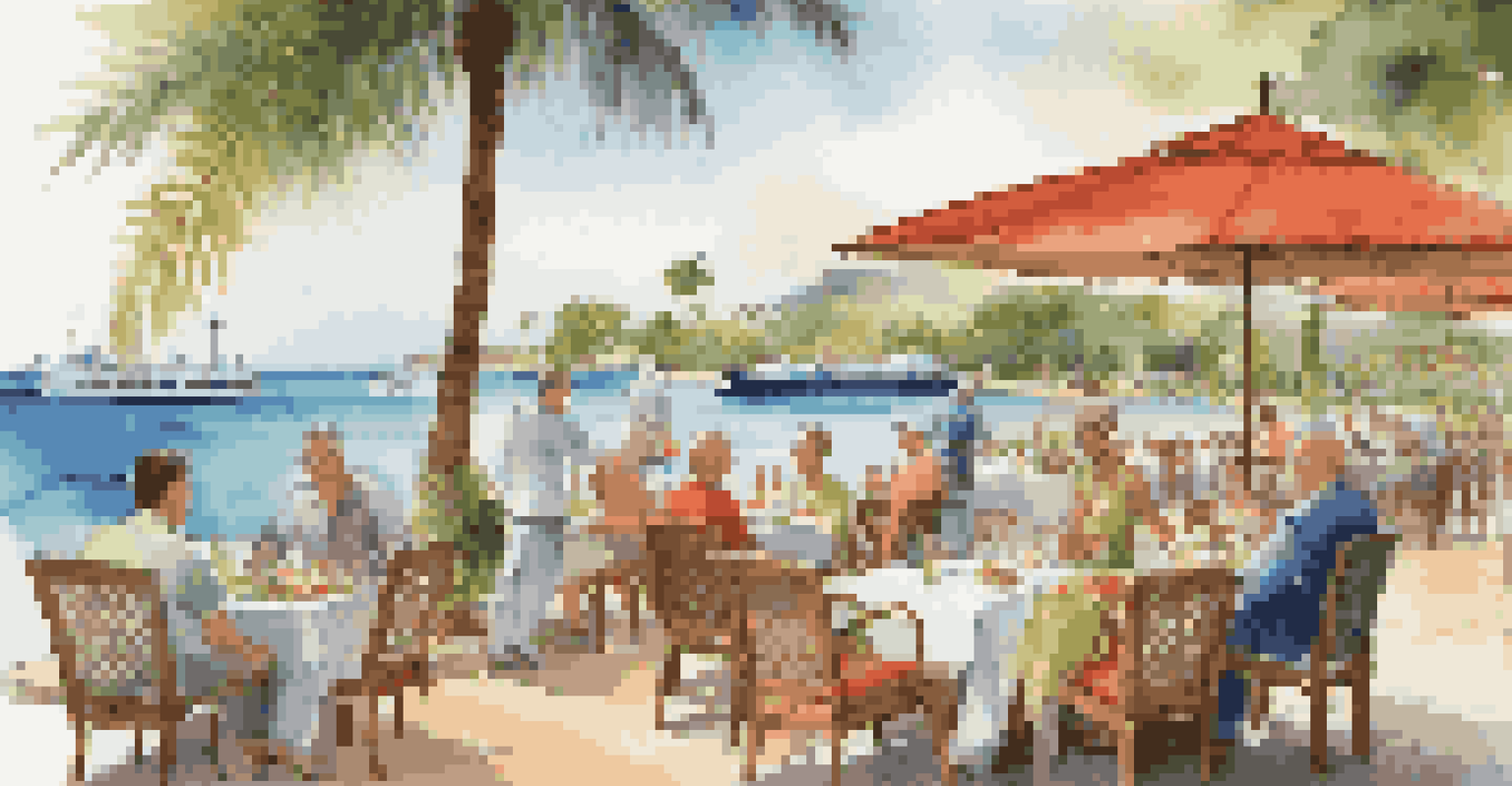Cruising with Dietary Restrictions: What to Expect

Understanding Your Dietary Needs Before the Cruise
Before you set sail, it's essential to identify your specific dietary restrictions. Whether you're gluten-free, vegan, or have food allergies, knowing your needs will help you communicate effectively with the cruise line. Understanding these requirements allows for better preparation and ensures you can enjoy your meals without worry.
You are what you eat, so don't be fast, cheap, easy, or fake.
Take some time to research the cruise lines that cater to your dietary preferences. Many cruise companies now offer specialized menus or options for various dietary needs, making it easier to find one that fits your requirements. It’s not just about eating; it’s about enjoying the culinary experience on board.
Once you've chosen your cruise, reach out to their customer service or guest services team. Inform them of your dietary restrictions well in advance. This proactive approach can lead to a more enjoyable and stress-free experience, as the kitchen staff will be prepared to accommodate your needs.
Communicating Your Needs Onboard
Once you’re on the ship, communication is key. Make sure to speak with the dining staff as soon as possible to reiterate your dietary restrictions. This ensures that they are aware and can take the necessary precautions to prepare your meals safely.

Don't hesitate to ask questions about the menu and how your meals are prepared. For instance, if you have a nut allergy, inquire about cross-contamination risks. Staff members are typically well-trained and accommodating, so they appreciate guests who are clear about their needs.
Know Your Dietary Needs
Identifying your dietary restrictions before the cruise helps ensure you can enjoy your meals without worry.
Some cruise lines offer dedicated meal planning sessions where you can discuss your requirements with the chef. This is a great opportunity to express your preferences and even request specific dishes that meet your dietary needs, making your dining experience more enjoyable.
Dining Options Available on Cruises
Most cruise ships boast a variety of dining options, from casual buffets to formal dining rooms. Each venue may offer different choices and flexibility regarding dietary restrictions. Familiarize yourself with these options so you can plan your meals around what’s available.
The greatest wealth is health.
Many cruise lines have embraced diverse dietary needs and include vegetarian, vegan, and gluten-free options on their menus. Some even offer special themed nights that cater to specific cuisines, making it fun to explore new flavors while adhering to your dietary restrictions.
If you’re not keen on the dining room options, many cruise lines allow you to order room service or dine at specialty restaurants that might offer more personalized meal choices. This flexibility can make your cruising experience more comfortable and enjoyable.
Preparing for Shore Excursions with Dietary Restrictions
When you dock at ports of call, don’t forget to plan for your dietary needs during shore excursions. Research local restaurants in advance that can accommodate your restrictions. Many popular tourist destinations offer a variety of dining options, including those catering to specific dietary preferences.
Consider packing snacks that fit your dietary needs while exploring the port. This way, you have something safe to munch on if local options are limited. It’s a simple yet effective way to ensure you don’t feel left out during meal times.
Communicate Onboard Effectively
Clear communication with dining staff about your dietary needs is crucial for a safe and enjoyable dining experience.
If you're participating in organized tours, communicate your dietary needs to the tour operators ahead of time. They often can arrange meals that cater to your requirements or suggest suitable dining options nearby.
Bringing Your Own Snacks and Meals
Many cruise lines allow guests to bring a limited amount of food onboard, which can be a lifesaver for those with strict dietary restrictions. Packing your favorite snacks or meal replacements guarantees you have safe food options when needed. Just be sure to check the cruise line’s policy on bringing food beforehand.
Think about items that are easy to pack and won’t spoil quickly, like protein bars, dried fruits, or gluten-free crackers. These can be great to have on hand for a quick snack between meals or as a backup if the offerings onboard don’t meet your needs.
However, it's important to strike a balance. While bringing your own food is helpful, you should also make an effort to enjoy the culinary experience the cruise offers. With proper communication, you might find that you can savor a wider array of dishes than you initially expected.
Navigating Buffets and Self-Service Areas
Buffets can be a daunting experience for those with dietary restrictions, but they also present a unique opportunity to explore diverse food options. Approach the buffet with a plan: look for dishes that clearly state their ingredients and avoid those that seem risky.
Don’t hesitate to ask the staff about specific dishes. They can guide you to items that fit your dietary needs and help you avoid cross-contamination. This is especially important if you have allergies, as staff members are usually trained to handle such inquiries.
Plan for Shore Excursions
Research local dining options and pack suitable snacks to accommodate your dietary needs during shore excursions.
Remember to observe how food is served in self-service areas. For instance, if you’re gluten-free, it’s wise to steer clear of areas where bread and pastries are present to avoid any risk of cross-contact. Taking these precautions will allow you to enjoy the buffet while staying within your dietary guidelines.
The Importance of Feedback and Reviews
After your cruise, consider sharing your experiences regarding dietary accommodations with others. Your feedback can help future travelers with similar dietary restrictions make informed decisions and encourage cruise lines to enhance their offerings.
Writing reviews on platforms like TripAdvisor or social media can be a fantastic way to support the cruise line that met your needs effectively. It not only helps other travelers but also highlights the importance of dietary accommodations in the cruise industry.

Moreover, don’t hesitate to reach out to the cruise line directly to express your gratitude or provide constructive criticism. Many companies appreciate feedback and are eager to improve their services based on guest experiences.